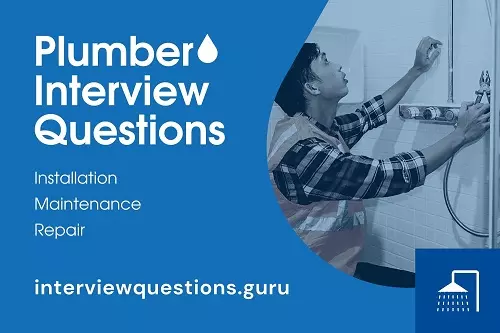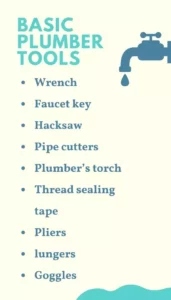The first step to a successful interview with a plumber is preparation. This blog post will go over 30+ common plumber interview questions that might be asked during an interview and provide tips on answering them.
Table of Contents
Who is a plumber?
A plumber is someone who installs, maintains, and repairs pipes that carry water. They also install sewer lines inside buildings to help dispose of wastewater.
Basic Plumber Interview Questions
Tell me about yourself?
Tip: The best way to answer this question is by listing your top qualities and qualifications for the job.
Example Answer: I am a hard-working and dedicated individual who has always been committed to providing the best customer service. I’m comfortable working in both team settings and independently, so you can count on me no matter what, and my communication skills are excellent.
What is your educational qualification?
Tip: The best way to approach this question is by listing all of your qualifications.
Example Answer: Although I didn’t finish college, I did receive my GED several years ago. Since then, I’ve learned through on-the-job training with some fantastic mentors in the industry who have taught me how to be an excellent plumber. I also have my plumbing certification and several years of experience.
Do you have any certifications related to plumbing?
Tip: This is an excellent question because it gives you the chance to show off your skills and expertise.
Example Answer: Yes! I’m certified in COIT cleaning procedures as well as general plumbing practices. In addition, I also have my certification through the EPA for lead paint removal and containment. Through all of these certifications, I’ve gained a lot of experience and knowledge that would benefit your company.
What is a check valve?
Example Answer: A check valve is a mechanical device that regulates fluid flow through it by opening and closing at predefined points or pressures. It helps keep things flowing smoothly in both directions, which is essential for keeping your plumbing system balanced and running smoothly.
What skills should a plumber have?
Tip: This question can be challenging because it depends on the specific job. However, some general skills plumbers are
- Problem-solving abilities.
- Customer service skills.
- Good communication skills.
- Skilled in Plumbing.
What is your availability?
Example Answer: I’m available for work Monday through Friday, from the morning or afternoon shift. I can also be available for on-call work if needed.
Top Interview Questions on Customer Service
Do you work on weekends, evenings and holidays?
Example Answer: No, I don’t typically work on weekends, evenings, or holidays. However, I am willing to be available for on-call work if needed.
Do you have any questions for us that we haven’t answered yet?
What plumbing tools are essential?
Tip: Think about the job description and what tools you would need.
Example Answer: Some essential tools are screwdrivers, pliers, wrenches, hammers, torches, Hacksaw, cutters, sealing tape, etc. These will be useful when there’s a leak or clog due to something being off-balance with one of your pipes.
Experienced Plumbers Interview Questions
What are some of the most common problems that plumbers solve?
Tip: This question will help you prepare for a potential problem that might come up in the interview.
Example Answer: One of the most common problems I’ve solved is fixing leaking pipes. I have a lot of experience repairing and replacing piping, so I know how to handle many different situations. I’m also comfortable with fixing clogged drains and sewer lines.
What are some of your recent projects?
Tip: This question will give the interviewer an idea of the recent types of jobs you’ve been working on.
Example Answer: Recently, I was part of a team tasked with repairing and replacing all of the plumbing fixtures in an apartment complex. We were able to replace every fixture, which is now up-to-date with today’s standards for safety.
What is your experience in the plumbing field?
Tip: This is an open-ended question that will allow you to give the interviewer a better idea of your background in this field.
Example Answer: I’ve been working as a plumber for several years now and have completed many projects, big and small. Whether it’s fixing water lines or sewer lines, repairing fixtures, or replacing them entirely.
I have a lot of experience in this field that I can bring to your team. Plus, I’m always up for learning new techniques and expanding my skill set.
What are some examples of typical plumbing jobs that you take on?
Tip: This question will help you better understand the interviewer’s expectations for this position.
Example Answer: I typically take on jobs responsible for repairing or replacing piping, fixing leaks, unclogging drains and sewer lines, and installing new fixtures.
I have a lot of experience in all of these areas, so I feel confident that I can handle any situation. Plus, I’m comfortable working with customers to ensure they’re happy with the result.
Have you worked with our company before and if so, what were your duties?
Tip: This question will help the interviewer better understand your past work experience with their company.
Example Answer: I have worked with your company in the past, and my duties included installing new plumbing fixtures, repairing leaks, and unclogging drains.
I completed all of my duties successfully and met all expectations.
What is your favorite part about being a plumber?
Tip: This question will give the interviewer a better understanding of what you like about this career.
Example Answer: I love that every day is different, and I never know what challenges I’ll face. It’s always exciting to see what new problem I’ll have to solve, keeping me on my toes.
Plus, it feels great to provide a valuable service for people and know that I’m making their lives better.
What is CPVC plumbing?
Example Answer: CPVC is short for Chlorinated Poly Vinyl Chloride, a plastic used to make plumbing pipes and fittings. It has good corrosion resistance properties, working well in areas with high water pressure. Plus, it’s cheaper and easier to install than metal piping.
Are PVC pipes safe for drinking water?
Tip: The interviewer is looking for a candidate with thorough and accurate knowledge of this topic.
Example Answer: PVC (Polyvinyl Chloride) has been shown to contain harmful chemicals like lead, which can mix into drinking water. Other materials can be used for drinking water, like CPVC or copper, so it’s best to avoid PVC.
How can hot water damage a pipe?
Hot water can make pipes expand and break. It is especially true for older pipes that weren’t designed to withstand modern-day plumbing systems’ high temperatures and pressure.
What’s the difference between a backwater valve and an air admittance valve?
Tip: Explain this topic in detail.
Example Answer: A backwater valve helps prevent sewer water from backing up into your home, such as when there’s too much pressure on the system or you have a clog.
On the other hand, an air admittance valve helps prevent sewer gas from entering your home. It does this by allowing air into the system when water is not flowing, which prevents the gas from building up.
Scenario-Based Plumber Interview Questions
What is the best way to measure, cut, thread, and assemble a new pipe?
Tip: This question tests your ability to think on your feet and solve a practical problem.
Example Answer: There’s no one-size-fits-all answer to this question, as the best way to do it may vary depending on the type of pipe and situation.
However, some tips include using a level to make sure the pipe is straight, marking the point where you need to cut it with chalk, and using a pipe cutter for clean cuts.
How do you diagnose a leaking pipe? What questions do you ask customers?
Example Answer: I would first ask questions about how often it’s leaking, where it’s located, if there are any noticeable water stains or mold near the area, and whether anything changed before it started leaking.
I would then look for clues like water pooled near the leak, wet insulation or carpeting, and rust or corrosion on the pipe. Finally, I would test the water pressure to see if it’s higher than usual.
How do you detach a clean-out plug?
Tip: The interviewer is looking for someone who has had experience with this type of project.
Example Answer: You’ll need to use an adjustable wrench or deep socket. To prevent damage, make sure the wrench isn’t too small, and it’s on the head of the plug rather than the nut.
If a customer experiences low water pressure, what are some possible solutions?
There are a few potential solutions, depending on the cause of the low pressure.
- I might try using a plunger or snake to clear it if it’s due to a clog.
- If the pipe is cracked or leaking, I would need to repair or replace it.
- If there’s not enough water coming into the house, I will check if the water main is turned on.
Other Plumber Interview Questions
Can you explain your experience with drain clearing?
What is your experience with heating and cooling systems?
Do you have experience in water heating systems and equipment?
How do you remove calcium deposits from plumbing?
What is the most common type of plumbing issue that you see?
What is the best way to clean up water?
What is a trap primer, and how does it work?
How long do toilets usually last before needing replacement or repair?
How do you turn off the main water supply to a house?
Are you familiar with the various types of chemical drain cleaners used in plumbing?
What are some of the most common mistakes plumbers make?
What safety protocols do you follow when working?
Resources
Conclusion
The best way to answer tough questions is to be prepared. Do some research on the company and the position you’re applying for. Practice plumber interview questions out loud to get comfortable with your responses.
We hope this blog post has been helpful and given you some ideas of what to expect during an interview.

